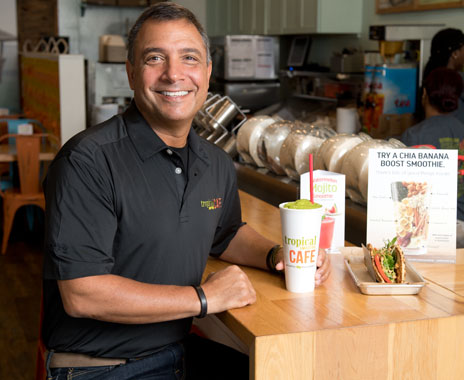What was the smoothie industry like two decades ago? Mike Rotondo chuckles at the question before flipping ahead to 2008. That was when it seemed like every major quick-service player in the business suddenly realized there was money to made in blended foodservice.
The CEO of Tropical Smoothie didn’t panic. “As I talked to some other folks in the smoothie industry who were smoothie concepts, they were kind of freaking out about it,” he says.
Rotondo understood the real ramifications at stake. All these burger, chicken, and sandwich concepts were actually doing was shining a light on something unique—something they couldn’t execute half as well as the brand with the product already in its name. “So few consumers had really ever had a smoothie that when these 1,000 unit [quick-service] brands brought out smoothies, they really kind of got people thinking about it. And it actually helped us,” he says. “We did not see a decrease in traffic when some of these big brands started throwing around smoothies. That didn’t hurt us. I think what it did was it helped people realize, ‘Well this isn’t a very good smoothie but boy, there’s a lot of benefits to smoothies.’ And that’s when they turned to us.”
There are no such issues today. Consumers are well aware of the health and convenience benefits of smoothies—two vitals that are robustly important to millennials. And the results can prove it.
Last year, Tropical Smoothie reported positive comp sales of 4 percent, which adds up to comp sale growth in excess of 26 percent since 2013. Average unit volume is more than $634,000—the highest in the company’s 20-year history. Fifty percent of those are actually reporting AUV of more than $806,000.
While the restaurant industry as a whole might be experiencing a rocky stretch, with February’s guest check growth of 1.2 percent representing the lowest rate in four years, it appears the market is ripe for smoothie-driven operations.
Rotondo’s eyes opened to this reality during the brand’s 2016 mobile app launch. Tropical Smoothie spent a great deal of resources on the platform, but wasn’t sure what to expect when it rolled out. The result: Over 1.5 million downloads.
“We are probably more excited than we’ve ever been,” he says. “And the reason for that is that Tropical Smoothie is really kind of emerging into this field that is on fire and we’re not just growing for growth’s sake. This is sustainable and hard-hitting. This is growth that is going to continue.”
Tropical Smoothie opened 86 restaurants in 2016, including its 500th unit. More impressive, though, is the fact it signed franchise agreements to develop more than 160 units across the U.S. Rotondo believes there’s an even more telling metric: “You look at a brand and you said you awarded 160 franchise agreements last year,” he says. “Yeah, and more than half of those came from existing franchisees. So we’ve got to be doing something right if the people who have now seen behind the curtain and experienced the brand are coming to us saying they want more of this.”
Tropical Smoothie’s growth is backed by the BIP Franchise Accelerator, a division of venture capital firm BIP Capital, which invested in the brand in 2010.
Rotondo is strapped in for an eventful 2017, a year the chain essentially plans to open two stores a week as it targets 100 new locations. Rotondo says this acceleration “definitely puts stress on every part of the system.”
Given that there’s only one corporate location in Atlanta, Tropical Smoothie’s franchise system better have the steel in place to support this kind of infrastructure. Rotondo says it does, and it’s only getting stronger.
Tropical Smoothie, which requires $125,000 in liquid assets and a minimum net worth of $350,000, as well as an initial investment of between $198,050 and $478,550 for its franchisees, actually turned down a crop of qualified candidates last year. The brand is simply getting more selective as it becomes more desirable.
The support center is also strengthening as success drives high-powered professionals into the building. Rotondo says Tropical Smoothie looks for entrepreneurs and savvy businesspeople to join its team, but also wants potential franchisees to grasp what this relationship entails.
“I wish I could claim this as a quote but a potential franchisee who’s a franchisee of many brands told me one time that his definition of franchisee and franchisor is that the franchisor is the brand and the franchisee is the heart. And one cannot function without the other,” he says. “The franchisor provides the processes and programs but the franchisee is the one who pumps. They’re the heart of the brand that continues to fuel the growth and stabilization of the brand.”
He adds that great franchisees aren’t just qualified professionals: they understand what it’s really like to be on that side of the table. “One of the things we look at when we look at franchise applications, outside of net worth and everything, is that they really have to have a great understanding of what it is to be a franchisee. I believe when franchisees don’t do well and they want to exit, it’s not because they fell out of love with the brand, it’s because they fell out of love with being a franchisee.”
Tropical Smoothie is a company, however, that gives its franchisees an audible voice. Every year, before the company’s conference, they host a smoothie contest for team members. Participants submit recipes, everyone from hourly employees to franchisees, and Tropical Smoothie makes them all. After whittling the list down to three options, a vote is held and the winner gets $500 plus a new blender, which runs well over $1,000.
And the ideas often get circulated into the system. That’s where the watermelon smoothie from a couple years ago came from, and the idea to use roasted bananas in a different offering.
The worst Rotondo ever sampled: spinach, kale, and peanut butter. “That was interesting,” he says.
The current arena is an exciting one for Tropical Smoothie as it propels forward. Rotondo says everything is in place to support this growth and sales boon, both of which he believes relate to each other and to the bigger picture.
“Everybody’s trying to make their own smoothies these days,” he says. “Even though that trend has continued, what I think people have found is that they still can’t make them as good at home as we can at Tropical Smoothie. And that’s something I don’t see changing.”







